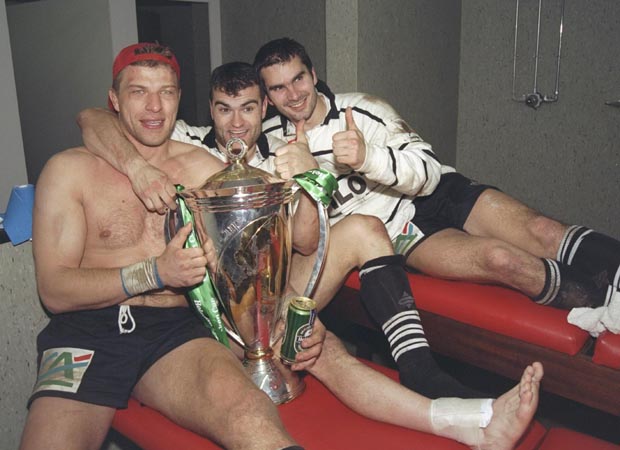 It is 16 years since Brive clashed with Bath in the 1998 Heineken Cup final in Bordeaux and at the time both clubs, who met in the Amlin quarter-final at the Rec on Sunday, looked set for a long period of domestic and European success. Massive talent, big crowds and passionate supporters. What could go wrong?
It is 16 years since Brive clashed with Bath in the 1998 Heineken Cup final in Bordeaux and at the time both clubs, who met in the Amlin quarter-final at the Rec on Sunday, looked set for a long period of domestic and European success. Massive talent, big crowds and passionate supporters. What could go wrong?
The intervening years have, however, been remarkably barren for both. Brive have won precisely nothing while Bath have fared little better with their 2008 Amlin trophy the solitary piece of new silverware in their trophy cabinet.
Both clubs, in those early days, seemed to have professionalism cracked but appearances were deceptive, especially in the case of Brive who, with our sketchy knowledge of French rugby at the time, we mistook as perennial giants of the French game. The reality was they were rural upstarts enjoying a blazing but brief moment in the sun. To this day they never won the French Championship.
But, for a couple of years, as the last Millennium drew to a close, what a side! No wonder we were fooled. Matches at the seething Stade Amédée-Domenech were played to the sound of chiming church bells and the unnerving smell of cordite as firecrackers exploded on and off the pitch.
Brive’s team of all the talents had taken the competition by storm the previous season with their breathtaking play and command performance againist Leicester in the final at Cardiff Arms Park while in the 1998 tournament they already had a historic extra-time semi-final win over Toulouse under their belt before they squandered what seemed a certain win over Bath in the final. In many ways they have never recovered since.
Close you eyes for a minute and it all comes tumbling back. Brive circa 1997-98 were the team and a group of oddball, almost cartoon, characters who made the Heineken Cup what it is. The inaugural competition in 1995-96, bar a decent final, was lacklustre but Brive ignited our interest in French club rugby and a full-scale European competition and we remain forever in their debt.
There was the suave Alain Penaud weaving his elegant magic, a fly-half who should have won 70 France caps, Sebastien Carrat, the 10.4secs 100m merchant sprinting the length of the pitch for yet another try and the long-legged Sebastian Viars at full-back who scored tries for fun and looked a million dollars every time he played for France but could never nail down a permanent spot.
Then there was the magnificently bad tempered kicking genius Christophe Lamaision, a Basque from Bayonne, who took the All Blacks apart for France at the 1999 World Cup semi-final and is the only sportsman I have ever encountered who would hiss if you ventured a question afterwards; Pumas captain Lisandro Arbizu with his slicked back Latin hair and Hollywood look and the ever pugnacious Philippe Carbonneau at scrum-half.
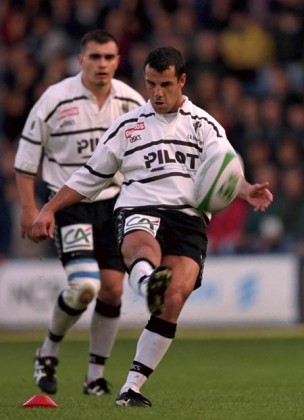
Up front was the Polish man mountain and former shot-putter Gregory Kacala in the back row; the former 400m hurdles runner Olivier Magne who morphed from a Sevens dandy into one of the world’s best opensides; a full blown old style French nutter in the front row in Laurent Travers and that indefatigable and underrated work horse in the back row Loic van der Linden who was as strong as the Belgian beer he drank.
They could and often did play rugby from the gods but Brive could be as rough as hell. If ever you bump into Jim Staples ask the former Ireland full-back about the mauling he got down there one Sunday afternoon playing for a star studded Harlequins side when Brive launched three consecutive bombs in his direction.
Staples was a man barely alive as he was hurried to a place of safety after being trampled into the ground after the third Garryowen and left for the circling vultures straying from the Massif Central to pick over at their leisure.
Brive’s epic home tie against Pontypridd earlier in the 1997-98 competition year produced some of the best rugby in the competition’s history and definitely the most spectacular mass punch-up on record, an altercation that flared up later that night in the infamous Bar Toussac where the teams gathered to complete unfinished business. You were never short of copy when reporting Brive.
In 1997, I think it was, we turned up the night before a quarter-final against Cardiff and the pitch was under two feet of snow. “Pas de probleme,” were told dismissively by club officials and when I arrived at the ground at 8am the following morning there was a squadron of ten heavy duty tractors from local farms shifting 200 tons of snow in the time it takes to open a bottle of pastis and light a Gitanes.
And then suddenly, soon after the Bath defeat, the balloon burst, the magic dissipated and Brive were exposed for what they really were. “We are a pretty remote rural community and the plain truth is that Brive has always been a small rugby town although we always try to punch above out weight,” says Simon Gilham an English ex-pat who has served as the club’s CEO since 2005.
“That incredible team of the late Nineties was almost freakish, a very rare coming together of exceptional rugby talent. That doesn’t happen very often in a rugby lifetime and it possibly gave British fans, just getting to grips with French rugby, a slightly false impression of our standing as a club.
“The reality is that, unless a billionaire benefactor suddenly emerges, Brive will continue to be a passionate but small town rugby team. We’ll always strive to be competitive but generally you’ll find us in the bottom half of the T14 or the top half of the Pro D2.
“We have a player budget of just 3.5m euros and an operating budget the second smallest in the T14 behind Oyonnax. Money is tight but we’re ticking over nicely, getting big home crowds and the club’s a happy place for players and fans.”
Soon after that defeat against Bath the club began to implode on and off the field. The board fell out spectacularly as egos clashed, there were resignations and takeovers and that confusion transferred itself to the playing field. The likes of Gregor Townsend were signed to spearhead a potent looking back division but the team suddenly started playing sterile ten-man rugby with Mr Grumpy – Lamaison – in charge at fly-half.
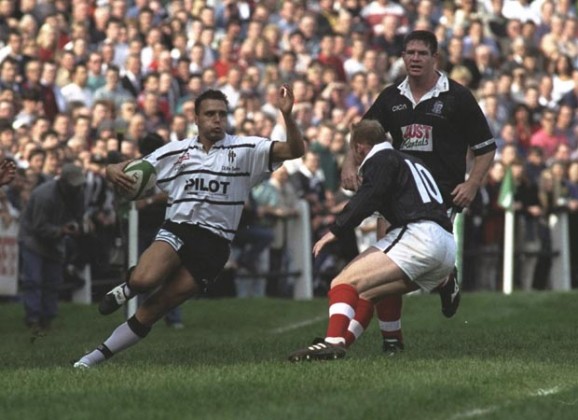
Brive were relegated to the Pro D2, bounced back again, and then in 2005 Brive was acquired by a wealthy businessman Daniel Derichebourg who bankrolled the club during the era England stars such as Ben Cohen, Steve Thompson and Jamie Noon joined. For a while all seemed well but by 2009 Derichebourg was under huge financial pressure himself and had to sell the club with Gilham and eight like-minded fans and businessmen forming a consortium to pay 1M Euros to buy Club Athletique Brive – their full title “It hasn’t been easy but we kept our heads above water back in Pro D2 and balanced the books. We are not over-reliant on any one income source, in fact no single sponsor is reliable for more than six per cent of our turnover. We won promotion back up to the T14 last season and the main thing is that the fans and the local Brive community have a solvent, vibrant and sociable rugby club to rally round. Bigger clubs than Brive have struggled for survival in France so to a certain extent we count our blessings.
“We are still in the ball game, participants rather than observers but we have to cut our cloth to suit. Philippe Carbonneau and Didier Casadei, the prop from the great side of the late Nineties, have formed a three-man coaching team with Nicolas Godignon and under them Brive have reverted to our old style – ferocious forwards, speedy running backs.
“Hand on heart I have to say that survival in the T14 is absolutely our priority and rather like the Premiership teams in the LV= Cup we have used the Amlin to blood a few youngsters while we rest some players. Much to our delight they qualified for the quarter-finals and rather than parachute some of those more established players in for the glory of a European knock-out game we’ll be sticking with those who served us so well earlier.
“Brive can still give anybody a bloody nose on our day at home. The Stade Domenech remains an intimidating venue and remember this is not the south of France. It can be really cold, wet and muddy here for much of the winter and some teams just don’t fancy it much on a miserable Friday night.
“We’ve beaten just about everybody at our ground this season – Toulon, Clermont, Toulouse, Montpellier – except, strangely, the bottom club Biarritz. We rejoice in our self-appointed David v Goliath role and our challenge is to nick these wins off the big boys.
“A victory over our great ‘local’ rivals from the Massif – mighty Clermont – is as important to our fans as a Wales win over England is for Welsh fans. So the town is abuzz this week after we beat them last Friday.
“If we continue to operate within our means Brive rugby can still bring a lot of joy locally. When we won the Pro D2 play-offs last season our supporters virtually filled the 35,000 Stade Chaban Delmas in Bordeaux and the drive back to Brive late that night was incredible with Brive fans passing and tooting our team bus the whole way home.
“It was way past midnight when we arrived in Brive and there were 10,000 fans in the small town centre waiting, having a party. We might not be in the mainstream here but it’s still rugby country. Brive will always be a hardcore rugby town.”


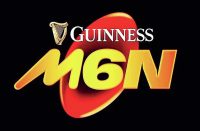
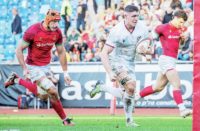




















Pingback: Lsm99 เว็บบอล Auto